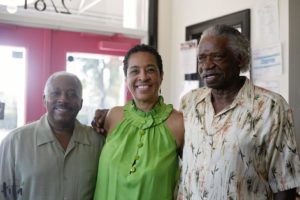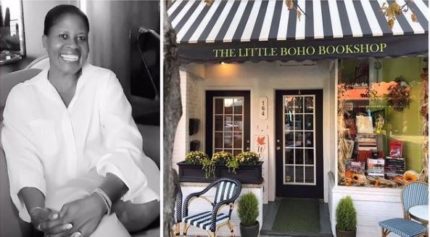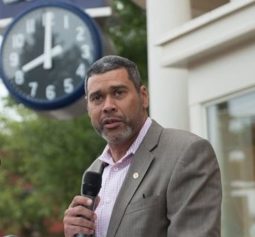
La Detra White (center) with owners of MasterShine shoe shining shop at Hartsfield-Jackson Int’l Airport. Image courtesy of La Detra White.
You could call it a hidden-camera show, but that’s not exactly what it is. It’s so much more than that.
When Atlanta entrepreneur La Detra White walks into a Black-owned business, the store owner can only guess the surprise she has up her sleeve. With her iPhone in hand, White broadcasts the moment she unveils a substantial monetary donation as a token of her unwavering support.
This isn’t a one-time event, however. White, who’s a corporate marketing professional and a business owner herself, has turned her dedication to supporting Black businesses into a movement she calls “Putting My Money Where My Heart Is.” For the past few months, she’s been staging and recording her “ambushes” live on Facebook in an effort to raise support and awareness for local businesses.
White said she started the movement because she felt too many people were focused on simply discussing issues within the Black community rather than actively doing something to solve them.
“What we need to show is us helping each other,” she said during an interview with Atlanta Black Star. “For me, it has always been about sowing in [to Black businesses.]”
To do her part, White said she started by opening an account at Citizen’s Trust Bank, a Black-owned financial institution with branches throughout Georgia and Alabama. She said she felt good after waiting over an hour to open an account at the bank, which has seen a huge surge in new patrons following recent pushes to bank Black.
But the glory was short-lived, as White said she still felt she hadn’t done enough to help the Black community. Roughly 8 percent of small Black-owned businesses fail within the first few months of operation simply because no one knows about them and no one is patronizing them. That’s what ultimately led White to stage her very first ambush — at a cupcake shop in Decatur.
Setting the tone for her future surprise “attacks,” White, along with with her daughter and best friend of over 10 years, filmed the emotional encounter as she awarded the cupcake shop owner with an undisclosed monetary donation. And she did the same for other local businesses, pouring thousands of dollars into a Black-owned barbecue and soul food restaurant; making a sizable contribution to a barbershop in Lawrenceville; paying one month’s rent for a local beauty supply store; and investing in a man’s shoe shine business to keep it from going under.
So where exactly does White get the money for her ambushes?
Earlier this year, she authored a book along with 31 other women titled “This Is My Story, But It Is Not My Life: Stories From Women Who Climbed Back.” The marketing executive then decided to take the profits from her successful book and sow it back into small, Black-owned businesses.
“I felt like the book really wasn’t mine, so I wanted to give the money away,” she said.
After the second ambush, White said her “Putting My Money Where My Heart Is” project went from a “me” movement to a “we” movement, as she starting bringing people with her to patronize the businesses she ambushed.
“What I love most and the reason I can go lay my head on my pillow and feel like I had done a good day’s work is [because] I know this isn’t about me,” she told ABS. “It’s bigger than me. I know it wasn’t orchestrated by me. I know that God’s hands were in it and He used me. And that gives me great satisfaction.”
“I love the idea that I’m being used as an instrument of change, as an instrument of inspiration,” White added. “Not just for my people, but a world of people, and that’s the most awesome part.”

La Detra White. Image courtesy of La Detra White.
Through her work, White is encouraging Black people to pay it forward and support one another in ways other than giving money, like loaning supplies or capital that businesses may need to thrive. She noted that other cultures have grasped the importance of giving back and keeping dollars circulated within their communities. In contrast, nearly 98 percent of Black money is spent outside the Black community.
White asserted that African-Americans have the power to change the trajectory of our culture and economic status by simply making the decision to support each other.
“In the places where there is a penetration of people of color, nearly all of our needs can be met if we’re willing to do a bit of research, talk to each other, refer a friend and share resources,” she said. “This way, [we] can begin to really understand the magnitude of the issue in terms of what the cost was of not supporting each other.”
White made it a point to note that in no way does she want her movement to come off as exclusionary because it focuses on patronizing and supporting Black-owned businesses. She said she wanted to start by helping her own people but eventually hopes to branch out by helping other businesses across the nation. Overall, White said she just wants to give businesses hope.
“I want them to know there’s a fighting chance,” she said. “In the next five years, I want this to truly be something we’ve duplicated all across the country. … I expect it to get bigger, I hope it never gets complicated, and I hope I’m always having fun.”


